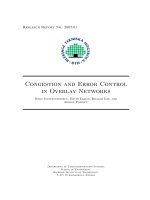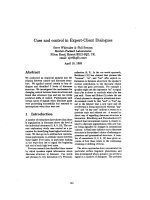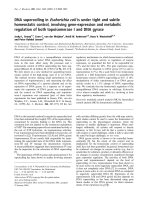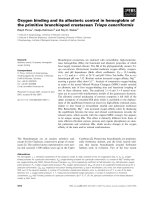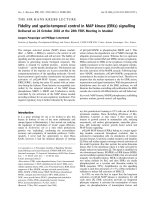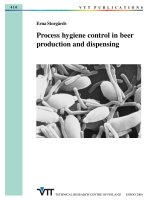DELIMITED CONTROL IN OCAML, ABSTRACTLY AND CONCRETELY
Bạn đang xem bản rút gọn của tài liệu. Xem và tải ngay bản đầy đủ của tài liệu tại đây (181.28 KB, 50 trang )
<span class="text_page_counter">Trang 1</span><div class="page_container" data-page="1">
Delimited Control in OCaml,Abstractly and Concretely
</div><span class="text_page_counter">Trang 2</span><div class="page_container" data-page="2"><b>I Applications</b>
Introduction to delimited continuations
Implementation
</div><span class="text_page_counter">Trang 3</span><div class="page_container" data-page="3">The subject of the talk the library of multi-prompt delimited control inOCaml. The library is called delimcc.
</div><span class="text_page_counter">Trang 4</span><div class="page_container" data-page="4">Delimited dynamic binding Oleg Kiselyov (FNMOC)
Chung-chieh Shan (Rutgers University)Amr Sabry (Indiana University)
ICFP 2006
</div><span class="text_page_counter">Trang 5</span><div class="page_container" data-page="5">The first application of the library of multi-prompt delimitedcontinuations in OCaml was implementing delimited dynamicbinding, presented at ICFP 2006. This is the title slide from that talk,given by Chung-chieh Shan.
</div><span class="text_page_counter">Trang 6</span><div class="page_container" data-page="6">Demo of persistent delimited continuations inOCaml for nested web transactions Fest 2008
Tokyo, JapanApril 13, 2008
</div><span class="text_page_counter">Trang 7</span><div class="page_container" data-page="7">A practical application of the delimcc library was to automagicallyturn console applications into CGI applications. You merely link theapplication with a different IO library. This process was demonstratedat the Continuation Fest in Toukyou two years and a week ago. Again,this was the title slide from that talk.
</div><span class="text_page_counter">Trang 8</span><div class="page_container" data-page="8">Shifting the stage
Staging with delimited control
Yukiyoshi Kameyama and Oleg Kiselyov and Chung-chieh ShanPEPM, 20 January 2009
</div><span class="text_page_counter">Trang 9</span><div class="page_container" data-page="9">The library turned out useful for writing efficient and comprehensibledirect-style code generators.
</div><span class="text_page_counter">Trang 10</span><div class="page_container" data-page="10">Monolingual probabilistic programming usinggeneralized coroutines
Oleg Kiselyov and Chung-chieh ShanUncertainty in Artificial Intelligence (UAI)
McGill University, 19 June 2009
</div><span class="text_page_counter">Trang 11</span><div class="page_container" data-page="11">Another, quite extensive application was a very shallow embedding ofa probabilistic domain-specific language. This is the first slide fromthat talk, first presented less than a year ago by Chung-chieh Shan, ata quite well-known AI conference.
</div><span class="text_page_counter">Trang 12</span><div class="page_container" data-page="12">Lifted inference: normalizingloops by evaluation
Oleg Kiselyov (FNMOC)Chung-chieh Shan (Rutgers)
Workshop on Normalization by Evaluation15 August 2009
</div><span class="text_page_counter">Trang 13</span><div class="page_container" data-page="13">We have found another application, normalization of MapReduce-loopbodies by evaluation. Chung-chieh Shan presented that talk at theLICS-affiliated workshop on normalization by evaluation. The
ostensible motivation was computing probabilities of getting swine flu.
</div><span class="text_page_counter">Trang 14</span><div class="page_container" data-page="14">Functional un|unparsing Kenichi Asai (Ochanomizu)
Oleg Kiselyov (FNMOC)Chung-chieh Shan (Rutgers)MitchFest, Northeastern University, Boston
23 August 2009
</div><span class="text_page_counter">Trang 15</span><div class="page_container" data-page="15">The type-safe printf and scanf are already available in OCaml, via
<i>ad-hoc typing rules in the OCaml type checker. We derived versions</i>
that don’t require such ad hoc extensions to the type system.Hindley-Milner system suffices.
</div><span class="text_page_counter">Trang 16</span><div class="page_container" data-page="16">Dynamic Logic in ACG:
discourse anaphora and scoping islands Logical Methods for Discourse
Nancy, December 15, 2009
</div><span class="text_page_counter">Trang 17</span><div class="page_container" data-page="17">Delimited continuations are useful in linguistics; one may argue thatmulti-prompt delimited control of the sort implemented in the delimcclibrary is even more useful. This talk made this argument, usingOCaml code to demonstrate sample analyses of English sentences.
</div><span class="text_page_counter">Trang 18</span><div class="page_container" data-page="18">I hoped to convince you that the library of delimited control in OCamlis quite useful, at least for writing papers. None of the above paperssaid anything about the library itself or its implementation. If you arecurious how it is implemented, you had to read the comments in thecode. There are a lot of them. Reading the comments is still a goodidea: the part about persistence of the delimited continuation is notdescribed in the FLOPS paper at all, due to space limit.
</div><span class="text_page_counter">Trang 20</span><div class="page_container" data-page="20">This FLOPS paper is about implementing the library. Before we get tothe implementation, we should remind ourselves what delimitedcontinuations are. I emphasize the word ‘remind’ since it is mycontention that everyone already knows delimited continuations.
</div><span class="text_page_counter">Trang 21</span><div class="page_container" data-page="21">”U2” has a concert that starts in 17 minutes and they must allcross a bridge to get there. They stand on the same side of thebridge. It is night. There is one flashlight. A maximum of twopeople can cross at one time, and they must have the flashlightwith them. The flashlight must be walked back and forth. A pairwalk together at the rate of the slower man’s pace:
Bono1 minute to crossEdge2 minutes to crossAdam5 minutes to crossLarry10 minutes to cross
For example: if Bono and Larry walk across first, 10 minutes haveelapsed when they get to the other side of the bridge. If Larry thenreturns with the flashlight, a total of 20 minutes have passed and youhave failed the mission.
Allegedly, this is a question for potential Microsoft employees.An answer is expected within 5 minutes.
</div><span class="text_page_counter">Trang 22</span><div class="page_container" data-page="22">There are two answers, neither of which are trick answers. Allegedly,this is one of the questions for potential Microsoft employees. Somepeople really get caught up trying to solve this problem. Reportedly,one guy solved it by writing a C program, although that took him 37minutes to develop (compiled and ran on the 1st try though). Anotherguy solved it in three minutes. A group of 50, at Motorola, couldn’tfigure it out at all.
</div><span class="text_page_counter">Trang 23</span><div class="page_container" data-page="23">Simple library for non-determinism
module type SimpleNonDet = sigval choose : ’a list -> ’a
val run : (unit -> unit) -> unitend
let fail () = choose []
</div><span class="text_page_counter">Trang 24</span><div class="page_container" data-page="24">A clear and elegant way of solving the puzzles like ours is to usenon-determinism. We assume non-deterministic functions with thesimple interface above. We assume that a non-deterministiccomputation will print out its result when it finishes. Therefore, itsreturn type, and the return type of run are both unit. The convenientfunction fail fails the computation.
</div><span class="text_page_counter">Trang 25</span><div class="page_container" data-page="25">Solving the puzzle
type u2 = Bono | Edge | Adam | Larrytype side = u2 list
let rec loop trace forward time_left = function| ([], _) when forward->
print_trace (List.rev trace)| (_, []) when not forward-> ...| (side_from, side_to) ->
let party=select_party side_frominlet elapsed = elapsed_time party in
let _ = if elapsed > time_left then fail () inlet side_from’ = without party side_from inlet side_to’= side_to @ party in
loop ((party,forward)::trace) (not forward)(time_left - elapsed) (side_to’,side_from’)
</div><span class="text_page_counter">Trang 26</span><div class="page_container" data-page="26">This code represents the specification of the problem, in the moststraightforward way. I’m sure everyone in the audience can write thiscode in their sleep. Perhaps only one function would give a pause.
</div><span class="text_page_counter">Trang 27</span><div class="page_container" data-page="27">Selecting a party
let select_party side =let p1 = choose side inlet p2 = choose side inmatch compare p1 p2 with| 0 -> [p1]
| n when n < 0 -> [p1;p2]| _ -> fail ()
Running the code to solve the puzzlerun (fun () ->
loop [] true 17 ([Bono;Edge;Adam;Larry],[]))
</div><span class="text_page_counter">Trang 28</span><div class="page_container" data-page="28">But even the selection function is most straightforward, if we couldnon-deterministically select an element from the list. And our simplelibrary provides exactly that function. The library also gives us a runfunction, to execute the computation.
</div><span class="text_page_counter">Trang 29</span><div class="page_container" data-page="29">Implementing non-determinism
let rec choose = function| []-> exit 666| [x]-> x
| (h::t) ->
let pid = fork () inif pid = 0 then helse wait (); choose tlet run m = match fork () with
| 0 -> m (); printf "Solution found"; exit 0|-> try while true do waitpid [] 0 done
with ...
</div><span class="text_page_counter">Trang 30</span><div class="page_container" data-page="30">One way to implement non-determinism is just to run all the choices,perhaps in parallel, and hope one of them eventually succeeds. At thepoint of making a choice, we split the computation into several parts.Each split-off computations proceed with one of the choices. Everyonehere knows how to split the computations: use fork.
It indeed works. It is interesting to watch, using top, how processesare launched and how they die, how their number increases anddrops.
</div><span class="text_page_counter">Trang 31</span><div class="page_container" data-page="31">Implementing non-determinism
let rec choose = function| []-> exit 666| [x]-> x
| (h::t) ->
let pid = fork () inif pid = 0 then helse wait (); choose tlet run m = matchfork ()with
| 0 -> m (); printf "Solution found"; exit 0|-> try while true do waitpid [] 0 done
with ...
</div><span class="text_page_counter">Trang 32</span><div class="page_container" data-page="32">I’d like to point out the fork in run: we split the computation into aprocess that does all the work, and the supervisor. As in real life, thesupervisor immediately goes to sleep. It wakes up when all theworkers are finished, to report the achieved result or an exception.Of course the implementation is slow: Unix processes are quiteheavy-weight. We need lighter processes: green threads, so to speak.
<i>We need a green fork.</i>
</div><span class="text_page_counter">Trang 33</span><div class="page_container" data-page="33">Green non-determinism
open Delimcc
let p = new_prompt ()
let choose xs = shift p (fun k -> List.iter k xs)
let run m = push_prompt p m
</div><span class="text_page_counter">Trang 34</span><div class="page_container" data-page="34">And here is the green implementation. The function shift is like fork.The latter returns to the parent a pid. In contrast, shift returns to theparent the representation k of the child process, as a function. Thechild process is suspended. (Please take the body of shift, List.iterk xs, as the parent computation and the computation where shiftappears, the ‘outside’, as the child computation.) When the parentapplies k to a value, the child process is resumed with that value.These difference between shift and fork are superficial, right? Thefunction push prompt too splits the computation, creating the workerthat executes m, and the supervisor that waits, handles failures andgets the result. In a sense, push prompt is like the try block. Theprompt is akin to a communication channel, which the child processuses to tell the supervisor of its final result or exception.
</div><span class="text_page_counter">Trang 36</span><div class="page_container" data-page="36">Highlights of delimcc
<small>I</small>
<i>It is a byte-code library</i>
<small>I</small> no changes to OCaml compiler/runtime
<small>I</small> perfect source- and binary- compatibility<small>I</small>
Direct
<small>I</small> no code transformations
<small>I</small> only the needed continuation prefix is captured
<small>I</small> fully integrates with native exceptions<small>I</small>
General
<small>I</small> don’t mess with the stack
<small>I</small> extensible to other languages
<small>I</small>
An informally justified implementation of the formallyjustified abstract machine
</div><span class="text_page_counter">Trang 37</span><div class="page_container" data-page="37">Our delimcc is a library, making no changes to the compiler or therun-time system of OCaml. Therefore, it is perfectly compatible withthe existing source code and even already compiled byte-code. It isdirect in that it captures only the needed part of the control stack.The implementation is general. We don’t mess with the stack
(introducing new frames or changing stack frames to mark them). Weuse OCaml’s own operations for stack manipulation. Since we
consciously avoid being tied to the structure of the stack, the
implementation can be extended to the languages other than OCaml.The implementation is not fully formally derived, and no Coq wasused. The correctness argument cannot be formal: after all, there isno formal specification of OCaml, with or without delimited control.The library implements an abstract machine that is formally justifiedby the definitional machine.
</div><span class="text_page_counter">Trang 38</span><div class="page_container" data-page="38">Generality and justification
<small>I</small>
Start with the definitional machine
<small>I</small>
Formally transform to a form suitable for implementation
<small>I</small>Derive scAPI, minimalistic API for low-level stack
</div><span class="text_page_counter">Trang 39</span><div class="page_container" data-page="39">We outline the process by which the library was half-way–formallyderived. The details are in the paper.
</div><span class="text_page_counter">Trang 40</span><div class="page_container" data-page="40">scAPI type ektype ekofftype ekfragment
val get ek : unit -> ek
val add ek : ek -> ekoff -> ekval sub ek : ek -> ek -> ekoff
val pop stack fragment : ek -> ek -> ekfragmentval push stack fragment : ekfragment -> unit
<small>I</small>
<i>No operations to scan the stack for a particular frame</i>
<small>I</small>
The format of the stack is unknown
<small>I</small>
Porting delimcc to a different language ≡ porting scAPI
<small>I</small>delimcc in Scheme; memory-efficient shift/reset in Scheme
</div><span class="text_page_counter">Trang 41</span><div class="page_container" data-page="41">Here is the scAPI. We have abstract types describing a mark on a stack(ek), a fragment of the stack between two marks, and the offsetbetween two marks. We need operations to extract a fragment of thestack between two marks and to put the fragment on the top of the
<i>stack. There are no operations to scan the stack looking for a</i>
particular frame.
Porting delimcc to a different language is essentially figuring out howthat other language could implement scAPI; the rest is automatic. Asan illustration, the delimcc distribution shows how delimcc can beported to Scheme. Specializing that implementation to one promptgives a new implementation of the ordinary shift/reset in Scheme. Itis different from that by Danvy and Filinski: our shift always capturesonly the needed prefix of the whole continuation, even though it relieson call/cc.
</div><span class="text_page_counter">Trang 42</span><div class="page_container" data-page="42">Continuations and exceptions let test2_ex lst =
let f x acc =if x = 0 thenraise Zeroelse x * acc inlet rec loop acc = function
</div><span class="text_page_counter">Trang 43</span><div class="page_container" data-page="43">What is this stack mark? How can we get hold of it if we don’t evenknow the structure of the stack? Let me use the following benchmarkcode from the delimcc distribution to describe marks. The goal is toreturn the product of the elements in a list of integers. Once weencountered a zero, we can return the result immediately. To this end,we throw an exception. The (contrived) code illustrates installinghandlers for other exceptions. They are transparently skipped over byour exception Zero.
</div><span class="text_page_counter">Trang 44</span><div class="page_container" data-page="44">Continuations and exceptions let test2_ex lst =
let f x acc =if x = 0 thenraise Zeroelse x * acc inlet rec loop acc = function
| []-> acc
| h::t ->push_prompt p’(fun () -> f h (loop acc t))in
</div><span class="text_page_counter">Trang 45</span><div class="page_container" data-page="45">We can write the code using delimcc. The two implementations haveexactly the same run-time performance, no matter whether zeroappears near the beginning or the end of the list. The functionpush prompt is really the try block. The paper spends a great dealexplaining that the mark is the identity of an exception frame; hencethe name ek used in scAPI. The marked frames are created by theOCaml run-time itself, when the try block is entered. In general, alanguage system that has exception handling is implementing a partof scAPI already. The paper even has a formal argument about it.
</div><span class="text_page_counter">Trang 46</span><div class="page_container" data-page="46">Undelimited vs delimited continuations
0 1 2 3 4 5 6 7 8 9
callccdelimcc
</div><span class="text_page_counter">Trang 47</span><div class="page_container" data-page="47">This graph illustrates the other part of scAPI. There exists a library of
<i>undelimited continuations for OCaml, providing callcc. Capturing an</i>
undelimited continuation copies the whole stack. The callcc librarydistribution comes with a co-routine benchmark. We can invoke thebenchmark either at the top-level (stack depth 0), or from a non-tailrecursive function that called itself 10, 20, etc. 100 times. The graphplots the running time vs. the stack depth. We also re-implementedthe benchmark using delimited continuations. Again, we plot therunning time vs. the depth of the stack at the time the benchmark wasinvoked. In either case, the benchmark creates two co-routines, whichinvoke each other. We need to only capture the continuation of thecurrent co-routine to the start of the benchmark. The delimccimplementation does exactly that; it doesn’t copy the whole stack. Toactually copy a part of the stack we use OCaml’s own mechanism tocopy the stack to re-size it.
</div><span class="text_page_counter">Trang 48</span><div class="page_container" data-page="48"><small>I</small>
in a language designed without regard to continuationpassing
<small>I</small>
no compiler plug-ins
<small>I</small>
no run-time extensions beyond the basic FFI
</div><span class="text_page_counter">Trang 49</span><div class="page_container" data-page="49">We have presented abstract and concrete implementations ofmulti-prompt delimited control. The concrete implementation is thedelimcc OCaml library, which has been fruitfully used for over fouryears. The abstract implementation has related delimited control toexception handling and distilled scAPI, a minimalistic API, sufficientfor the implementation of delimited control. A language systemaccommodating exception handling and stack-overflow recovery islikely to support scAPI. The OCaml byte-code does support scAPI, and
<i>thus permits, as it is, the implementation of delimited control. We</i>
described the implementation of delimcc as an example of using scAPIin a typed language. This library shows that delimited control can beimplemented efficiently (without copying the whole stack) andnon-invasively in a typed language that was not designed withdelimited control in mind and that offers no compiler plug-ins orrun-time extensions beyond a basic foreign-function interface.
</div>